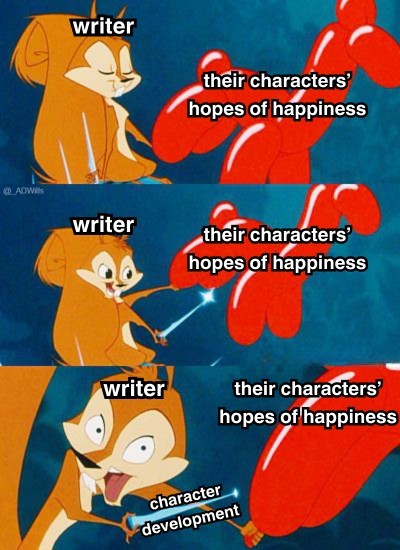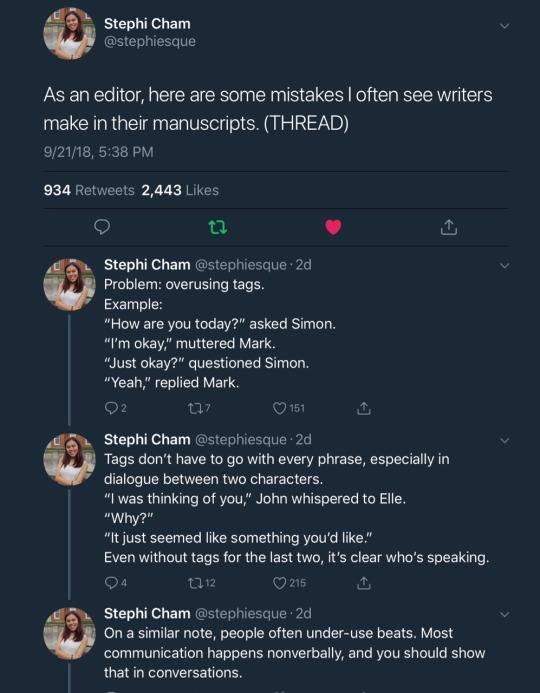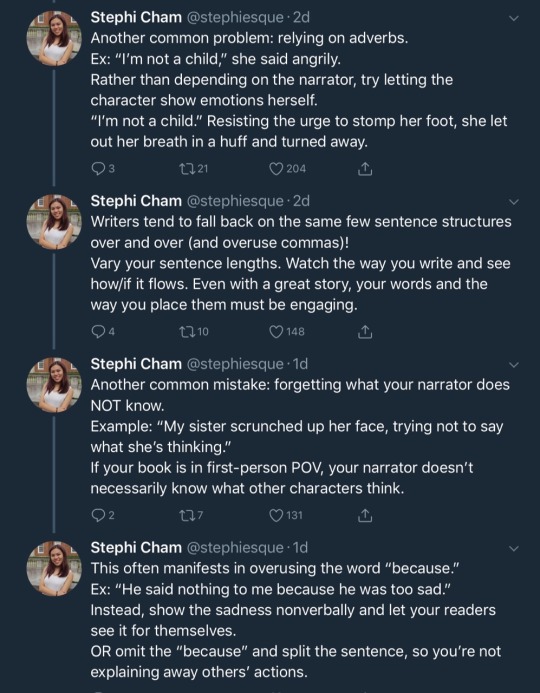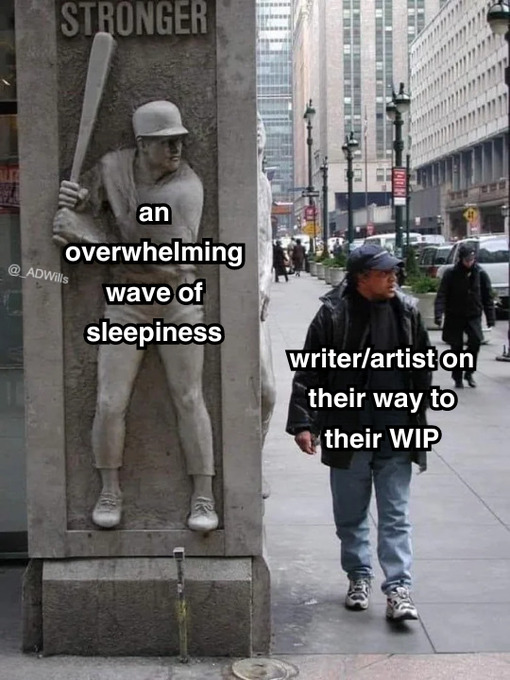Text
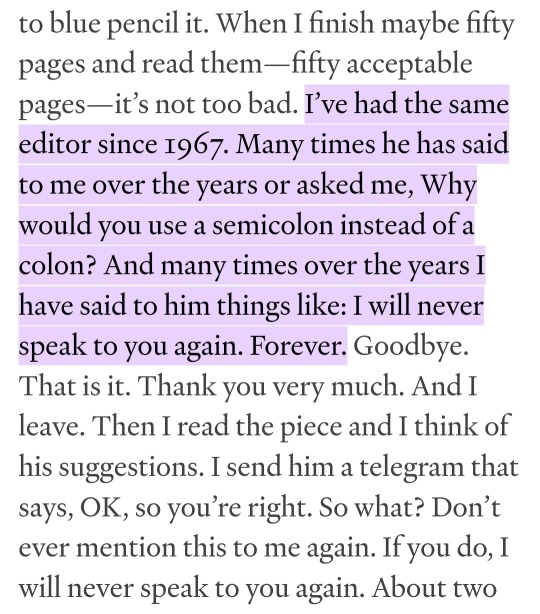
maya angelou saying the funniest thing anyone has ever said about editing, which i can never let myself forget EVER AGAIN [x]
43K notes
·
View notes
Text

This was in my head and I had to make it.
#nanowrimo#national novel writing month#camp nanowrimo#camp nano#writing#writer#author#arrested development meme#writing meme#writing memes#writer memes#writer meme#writers of tumblr#writblr#writeblr
397 notes
·
View notes
Text
WEIRDLY SPECIFIC BUT HELPFUL CHARACTER BUILDING QUESTIONS
What’s the lie your character says most often?
How loosely or strictly do they use the word ‘friend’?
How often do they show their genuine emotions to others versus just the audience knowing?
What’s a hobby they used to have that they miss?
Can they cry on command? If so, what do they think about to make it happen?
What’s their favorite [insert anything] that they’ve never recommended to anyone before?
What would you (mun) yell in the middle of a crowd to find them? What would their best friend and/or romantic partner yell?
How loose is their use of the phrase ‘I love you’?
Do they give tough love or gentle love most often? Which do they prefer to receive?
What fact do they excitedly tell everyone about at every opportunity?
If someone was impersonating them, what would friends / family ask or do to tell the difference?
What’s something that makes them laugh every single time? Be specific!
When do they fake a smile? How often?
How do they put out a candle?
What’s the most obvious difference between their behavior at home, at work, at school, with friends, and when they’re alone?
What kinds of people do they have arguments with in their head?
What do they notice first in the mirror versus what most people first notice looking at them?
Who do they love truly, 100% unconditionally (if anyone)?
What would they do if stuck in a room with the person they’ve been avoiding?
Who do they like as a person but hate their work? Vice versa, whose work do they like but don’t like the person?
What common etiquette do they disagree with? Do they still follow it?
What simple activity that most people do / can do scares your character?
What do they feel guilty for that the other person(s) doesn’t / don’t even remember?
Did they take a cookie from the cookie jar? What kind of cookie was it?
What subject / topic do they know a lot about that’s completely useless to the direct plot?
How would they respond to being fired by a good boss?
What’s the worst gift they ever received? How did they respond?
What do they tell people they want? What do they actually want?
How do they respond when someone doesn’t believe them?
When they make a mistake and feel bad, does the guilt differ when it’s personal versus when it’s professional?
When do they feel the most guilt? How do they respond to it?
If they committed one petty crime / misdemeanor, what would it be? Why?
How do they greet someone they dislike / hate?
How do they greet someone they like / love?
What is the smallest, morally questionable choice they’ve made?
Who do they keep in their life for professional gain? Is it for malicious intent?
What’s a secret they haven’t told serious romantic partners and don’t plan to tell?
What hobby are they good at in private, but bad at in front of others? Why?
Would they rather be invited to an event to feel included or be excluded from an event if they were not genuinely wanted there?
How do they respond to a loose handshake? What goes through their head?
What phrases, pronunciations, or mannerisms did they pick up from someone / somewhere else?
If invited to a TED Talk, what topic would they present on? What would the title of their presentation be?
What do they commonly misinterpret because of their own upbringing / environment / biases? How do they respond when realizing the misunderstanding?
What language would be easiest for them to learn? Why?
What’s something unimportant / frivolous that they hate passionately?
Are they a listener or a talker? If they’re a listener, what makes them talk? If they’re a talker, what makes them listen?
Who have they forgotten about that remembers them very well?
Who would they say ‘yes’ to if invited to do something they abhorred / strongly didn’t want to do?
Would they eat something they find gross to be polite?
What belief / moral / personality trait do they stand by that you (mun) personally don’t agree with?
What’s a phrase they say a lot?
Do they act on their immediate emotions, or do they wait for the facts before acting?
Who would / do they believe without question?
What’s their instinct in a fight / flight / freeze / fawn situation?
What’s something they’re expected to enjoy based on their hobbies / profession that they actually dislike / hate?
If they’re scared, who do they want comfort from? Does this answer change depending on the type of fear?
What’s a simple daily activity / motion that they mess up often?
How many hobbies have they attempted to have over their lifetime? Is there a common theme?
50K notes
·
View notes
Text
“how did you get into writing” girl nobody gets into writing. writing shows up one day at your door and gets into you
125K notes
·
View notes
Text
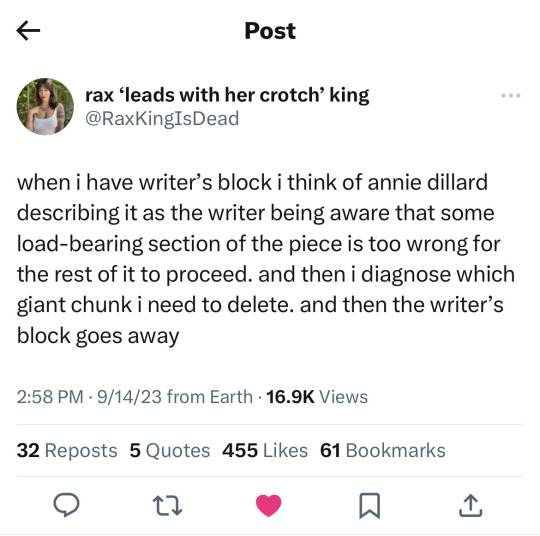
Saw this advice on Twitter today, and I think it's going to end up being useful for me. 🥹 Thought I'd share it with y'all, too.
11K notes
·
View notes
Text
“Why is this taking me so long to write?” I ask myself.
And then I count the words I’ve written so far and they total 133,000 and I realize I should be a smidge more patient with myself
Be patient with yourself.
You’re writing novel-length shit out there.
259 notes
·
View notes
Text
A. SHITTY. DRAFT. IS. ALWAYS. BETTER. THAN. NO. DRAFT.
Thank you.
19K notes
·
View notes
Note
Hey! Do you have any tips for breaking writers block when you're adhd and/or autistic? Be it your own tips or a link to another post? My friend and I need help haha
Ahh sorry you got buried under spam and old ask game asks. (I... really need to sort my ask box >.<' ). But here we go, a month late, and hopefully better late than never:
Quick ideas for beating writer's block when autistic and/or ADHD
I've got this old post I wrote on writer's block and focus troubles. Ironically, this was before my autism diagnosis but the tips still happen to be things I, an autistic person, did to manage writing when faced with executive dysfunction (except I didn't know what executive dysfunction was at that point lol). I'm linking this with one important caveat, though: if you have ADHD, "stepping away" might do more harm than good; struggling to start tasks is a Big Thing with ADHD, so not starting the task at all is entirely counterproductive. (Unless you're in burnout! Here's a post about the differences between block and burnout with some ideas on what to do for each, in case that's at all helpful to you).
And here's something yoinked from another old ask-answer:
sometimes a break from more “serious” writing is what you need. Maybe try and take the characters from your main project and drop them somewhere else for the hell of it. I like to throw my characters into the MCU without warning like “lmao have fun in a strange modern world where there are gods and a guy in an iron flying suit bye.” Or, if fandom cross-overs aren’t your thing, find a writing prompt or take an idea you like and use it to form a short story with your characters instead.
Some other ideas I've seen around for writer's block with ADHD/Autism are:
Try voice recording or text to speech (i.e., absolute stream-of-consciousness unfiltered brain-to-mouth, giving yourself permission to 100% bullshit if you like, and see what rattles loose in the brain box)
Stream of consciousness writing in general, not even necessarily about a particular prompt or particular project. This one can be done in combination with:
Writing sprints! One minute timers, two minute timers, five minutes – set it for as long as you want, but when you're fighting executive dysfunction and/or difficulty focusing, the burst of urgency that comes from a shorter timer is very helpful.
And speaking of the sense of urgency: gamify your writing! There are different ways to do this, with varying elements of risk. I'll link some ways to do this at the end under "resources".
Exercise. I don't necessarily mean hitting the gym, but a quick burst of exercise prior to writing to get the heart rate up can help wake your brain up a bit. (Or, if you find repetitive exercise mind-numbingly boring like I do, the writing sure does start to look appealing lol).
Meditation. Okay, this one is sort of 🤔 for me, because I do often hear from fellow autistics and our ADHD cousins that meditation is literally impossible for us. It is for me. But! Like with exercise above, if meditation bores you instead of helping relax and ""clear your mind"", you can probably use that boredom to your advantage. Or, it might work as intended.
Change your workspace/situation/routine. Sometimes the problem is that you need new sensory input, or that your brain has gotten thoroughly bored and decided not to tell you. Use a different chair. Move to the kitchen table. Write at a different time of day. Have a different snack (or try having a snack while writing...). Basically, look at what you're currently trying, and see how you can do it differently.
It's also really good practise to get comfortable with Being Bad At Writing. Perfectionism and Rejection Sensitive Dysphoria are the biggest, meanest brain weasels with the sharpest teeth. Don't let them bully you. It sucks. It takes a lot of time and effort and internal work, which is why I was loathe to include this on a post of quick solutions, but. It is important.
And getting comfortable with this doesn't necessarily mean learning how to accept critique, or accepting that sometimes you'll write things that suck. It means accepting that sometimes you won't handle critique or feedback well, and also accepting that you won't always manage to beat the writer's block or be productive. Sometimes you have to make peace with the fact that you're going to feel horrible, feel your feelings, and try to remind yourself on the other side that none of it means you're a talentless hack.
Resources
Anything with a 🪙 next to it is paid only (I've tried to limit these and find alternatives).
The resources are split into things that "gameify" writing (i.e., hack your dopamine/serotonin in ways that reaaaaallly help autistic and ADHD folks), writing programs that are designed to help you focus, writing programs that track your habits and appeal to the "ohhhh numbers going up" brain, focus-aiding apps, and some miscellaneous stuff. Under the cut to save your dashes.
"Gamifying" your writing:
The Most Dangerous Writing App – You can't stop typing before your set timer runs out, or you risk losing your work. Excellent for warming up, stream-of-consciousness, or if you're feeling reckless, working on your actual project. I did a lot of the second draft of When Dealing with Wolves on this thing (it was terrifying yet highly effective).
Written? Kitten! – Get rewarded for meeting your set writing wordcount with kitten pictures. Haven't used this one personally, but heard wonderful things about it.
4TheWords 🪙 – This one gamifies writing in the most literal sense. As in, it's an online game where you defeat monsters, explore and level up by writing words. I did the free trial a couple years back, and I've heard there are a lot of different ways you can lower the subscription cost. The only reason I haven't gone back to it is because I feel like I can't justify spending money on it when I'm doing fine with Scrivener and free resources, but maybe one day I will purely for the fun factor...
StimuWrite – similar idea to Written Kitten; the app provides visual/audio stimulation while you write, which is great for many ADHD-ers and autistics. There's a progress bar, soundscape options, typing effects and emoji reactions as rewards, among other features.
Write or Die – This is The Most Dangerous Writing App meets Written Kitten. As far as I can figure out, the basic web version is free to use; you can set the parameters like how how long you want to write for, how many words to reach, and whether you want rewards for meeting goals or punishments for failing to meet them. There's also a stimulus mode, where the nice auditory stimulus goes away if you stop writing.
Minimalist/Focus writing programs:
Focus Writer [Windows] – thoroughly stripped-down minimalist word processor. As far as I know, it has basic functions like find-replace, but mostly it's designed only for writing. Not for formatting, spellchecking or editing.
iA Writer 🪙 [iOS] – Similar to Focus Writer, it's designed to fill your screen with a simple workspace. Allows you to use markdown formatting, and has a feature called Focus Mode that blurs out everything except the sentence you're typing. (If I could find a Windows-friendly alternative to this with that same feature I would be so happy). A cheaper alternative is 1Writer, but that doesn't have the focus mode.
Typewrite Something – Absolutely bare minimum web-based typewriter simulator. Basically just a blank screen that you start typing on, and the words appear in a typewriter font. Great for stream-of-consciousness without the risk level of TMDWA because you can't backspace. If you don't like the clacky sound, turn off your volume.
Focus Apps
Cold Turkey – Block applications and websites on your laptop/computer for a specified period of time. You can even block the entire internet.
Forest – Similar to Cold Turkey in that it stops you from seeking distractions or getting distracted. Set a timer and the app starts growing a tree. If you leave the app, the tree dies. Once you have a tree, you add it to your forest.
Habit-building writing programs:
Novlr – Simple, minimal layout, and tracks your writing goals per month and day, and your daily streak. There are more features in the plus and pro versions, and you can only have five projects in the free version, but otherwise it looks like a good free alternative to the next two programs:
750 Words 🪙 – Made for free writing, but also very useful for drafting. I had it for a month or so a while back on the free trial. It tracks writing streaks and gives you fun graphs and statistics at the end of each session, including number of distractions, actual typing time vs total time and average words per minute. Also, it analyses the mood of what you wrote, which I always found delightful.
Writing Analytics 🪙 – If writing streaks, badges and analytical graphs get your dopamine going, then I really recommend this one. The writing screen itself is very minimalistic, but it still shows your writing speed (I loved watching that go up) and your goal progress. In terms of analytics, it tracks a LOT of different things, including time spent writing vs revising, average wordcounts per day/month/year, and words written vs words deleted. I used this for about a year before I switched to Scrivener, and the switch was purely because I needed something that wasn't subscription-based. (Apparently since I stopped using it there's also a new feature that lets you create private writing rooms and see other writer's progress).
Misc.
WriteTrack – Not a word processor, but it has very good tools for tracking and planning your writing. Again, if graphs going up helps your brain, this is excellent, but you can't see it in real time.
10 ADHD-friendly brain tricks for writers – what it says on the tin: ten tips for writers with ADHD; I'm particularly fond of "Put away one knife", which breaks the nebulous task of "start writing" into something really simple like just... pull out your desk chair.
152 notes
·
View notes
Note
Hey Maggie! This is maybe a bit of a difficult question, at least to ask, but do you have any advice for handling chronic pain in a general since? I have both mental and physical chronic pain and some days it’s just... hard to be a creator, or to have enough spoons because of one thing or another. How do you fight it? Thanks! Annie
Dear oquinn53,
It’s hard to describe to non-creators how difficult it is to be abstract when you’re in pain, or when you’re exhausted, or when illness or drugs or mental illness has washed you up on a strange chemical shore. All art requires an element of abstraction, of big picture thinking, because art at its heart is simply the act of imposing artificial structure upon the world. With writing, you don’t even have the concrete sensory anchor of paint or clay or bricks. You have only words, in themselves already art, some past human’s clumsy attempt to translate a concept to a vocalization.
When you’re an animal under duress, the big picture feels very unimportant.
I’ve talked a little bit about my health struggles over the past 18 or so months, the implosion of my immune system, the shrinking diet, the fatigue, the failure of my adrenals, the discovery that hookworms were living in my fucking face. It was all pretty impossible. The part that made it the most impossible? The brain fog. Brain fog’s pretty common with all sorts of inflammation, and before I figured out that a huge part of my problem was that I had face-friends, I was pretty much always locked in brain fog. Some days it was just confusion. Light inability to finish sentences predicted from 3-6 pm, bring an umbrella. Other days, I couldn’t remember my home address.
The problem was I had a book due. So I threw myself against it, because that’s how I had always approached life. Screw you, brain fog, illness, allergic reaction, I’m just going to push through.
I would get up every morning and begin working on ALL THE CROOKED SAINTS. One labored word after another. I would sit at the computer for 12 hours to accomplish a paragraph. The next day, if the fog had cleared a little, I would ditch all of the repeated words and the sentences that led to nothing. Most days that was everything. Some days I got to keep a few sentences. On good days, I tried to use my brain to solve big picture problems and get enough of it down that my fogged brain the next day wouldn’t mess it up too much. Then I would get up the next day and I would do all this again. 12 hours. 1 paragraph. I would do it again the next day. The next day.
I used to write rough drafts in four months in four hours of writing every other day. With Saints, I wrote for 12 hours a day for an entire year. Quite literally I did nothing else — everything else fell apart and away. I muscled through. If I couldn’t understand words, I sat there and I typed nonsense until I could. I read it aloud until the words sounded familiar. I leaned heavily on every beta reader and critique partner — tell me when I start to make a book, friends, please, tell me when I’ve gotten into the weeds. Finally I managed to turn it in.
People say that book doesn’t sound quite like my others — no, it wouldn’t. I fought wars for that book. They say it sounds more precise, more poetic, more deliberate. Yes, it would. Every word was stolen, snatched, cobbled, carefully assembled. I can reread any of my other books, but not that one. I open it to a random page and I can only remember the weeks it took to accomplish each of them.
I’m telling you all this because I was wrong.
Back in early spring of this year, after I’d gotten the hookworms out of my face but while I was still dealing very intensely with all the physical damage left behind, a very wise woman gave me a piece of advice. She told me to start a journal. In the morning, she said, write down the percentage that I felt I was that day. 20% Maggie. 90% Maggie. Then I should write down what I accomplished that day.
I thought at this point she was going to tell me to admire how much I’d gotten done each day despite being ill. I didn’t want that; I didn’t need a pep talk. I needed my brain.
But that wasn’t what she said. She told me: write down what you’ve managed to do on a 20% day, what you’ve managed to do on a 40% day. Eventually you’ll have a guide so when you wake up and you’re at 20%, you won’t try to do the things you do on a 40% day. You’ll know you can just go watch a movie or sit with your goats or whatever and not feel guilty, because you were never going to write words you could keep or be able to exercise or whatever.
And that was the right way.
It meant I no longer labored for 12 hours each day, doing nothing but trying to smash my way through a draft. Instead I slowly began to write bits and bobs in on my good days. A funny thing happened then: once I was not spending every second forcing myself to do things I couldn’t, I found I had enough energy to actually start to work on myself. To look for patterns in my good and bad days. To research healthcare providers and new studies on what was wrong with me still. Slowly I found I was able to chain more of the 60% days together, then 80% days. Slowly I began to realize that although it was taking months, I was improving overall.

I threw out every labored word I had written on my current book and I began again with ferocious and structured joy. It took me only a few weeks to completely regain the wordcount of that draft I forced, only this book was free and easy and ridiculous and batshit and I loved it.
I still have 20% days. Really, seriously, don’t let hookworms in your face, especially if you already have an underlying condition. I don’t know when I’ll actually be completely better. But I do know that on those 20% days, I don’t have to make things. It’s ok. I can spend those days enjoying whatever I can. Consuming art instead of making it. That’s enough. That’s right.
I’m very proud of Saints, both how it turned out and what it took from me. But I wouldn’t wish that on anyone. There’s a better way.
Good luck,
urs,
Stiefvater
2K notes
·
View notes
Text
guy who has only read the epic of gilgamesh reading the second written narrative: getting a lot of epic of gilgamesh vibes from this
15K notes
·
View notes
